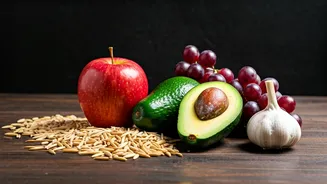Oats and Fiber Power
Oats are a cornerstone in the dietary approach to cholesterol management. Packed with soluble fiber, oats have a remarkable ability to bind with cholesterol in the digestive
system, preventing its absorption into the bloodstream. When consumed regularly, the soluble fiber found in oats can significantly contribute to reducing LDL (bad) cholesterol levels. Oatmeal, whether prepared traditionally or in overnight oats, can be a simple yet effective way to kickstart your day with a cholesterol-lowering boost. Consider adding various toppings such as berries and nuts to boost the flavor. Furthermore, oat bran, which is the outer layer of the oat grain, is another excellent source of soluble fiber, making it another useful ingredient for those looking to manage cholesterol. In addition to oats, other foods rich in soluble fiber include apples, pears, and beans, which work in a similar way to help lower cholesterol by impeding its absorption.
Fatty Fish Benefits
Integrating fatty fish into your diet offers a delicious pathway to lowering cholesterol levels. Fish such as salmon, mackerel, and sardines are rich in omega-3 fatty acids. These essential fats have been clinically shown to reduce triglycerides, which are another type of fat in the blood. Moreover, omega-3s can increase HDL (good) cholesterol, providing additional benefits for cardiovascular health. Incorporating fish into your diet a couple of times per week can yield significant results. Try grilling, baking, or pan-searing fish to retain its nutritional value. In addition to its impact on cholesterol levels, omega-3s have also been shown to improve overall heart health by reducing inflammation and supporting healthy blood vessel function. Therefore, the consumption of fatty fish is not just a cholesterol-lowering strategy; it's also a comprehensive approach to enhance cardiovascular well-being.
Nuts and Seeds
Nuts and seeds are miniature powerhouses of heart-healthy nutrients that can contribute to lower cholesterol levels. Almonds, walnuts, and flaxseeds are particularly beneficial due to their high fiber and unsaturated fat content. These components support the reduction of LDL (bad) cholesterol. Consuming a handful of nuts or a tablespoon of seeds daily can make a notable difference in your cholesterol profile. These foods offer a satisfying snack and can be easily incorporated into meals, such as sprinkled over salads, mixed into yogurt, or added to smoothies. Beyond their cholesterol-lowering properties, nuts and seeds also provide vitamins, minerals, and antioxidants that are vital for overall health. This strategy is also helpful because it can keep you full longer, which might reduce unhealthy snacking. Remember, moderation is key, as nuts and seeds are calorie-dense. Maintaining a balanced intake allows you to reap the benefits without excess calorie intake.
Avocado's Role
Avocados are rich in monounsaturated fats, which are known to help reduce LDL cholesterol levels while raising HDL cholesterol. This fruit is also packed with nutrients like fiber and plant sterols, which further aid in lowering cholesterol absorption. Avocados can be easily integrated into a variety of meals, whether sliced into salads, mashed into guacamole, or spread on toast. The creamy texture and mild flavor of avocados make them versatile and appealing to include in your daily diet. Consuming one avocado a day can have a significant effect on your cholesterol levels, along with providing other health benefits. Their high nutrient density supports overall wellness, including improved heart health. Therefore, incorporating avocado into your diet is a simple yet effective way to support your cholesterol management goals.
Plant Sterols' Power
Plant sterols and stanols are naturally occurring substances in plants that can help lower cholesterol by blocking its absorption in the small intestine. These compounds are commonly added to various food products like yogurt, orange juice, and other spreads. Studies indicate that consuming foods enriched with plant sterols can significantly reduce LDL cholesterol levels. The recommended daily intake of plant sterols is typically between 1.5 to 3 grams to achieve optimal benefits. Although these sterols occur naturally in some foods, such as fruits, vegetables, nuts, and seeds, you might not consume enough to have a significant effect on your cholesterol. Therefore, choosing foods that have been fortified with plant sterols is an effective strategy. It is essential to include these foods as part of a balanced diet for the best results, in conjunction with other cholesterol-lowering strategies. Plant sterols and stanols are safe and effective tools for those looking to manage their cholesterol levels.















